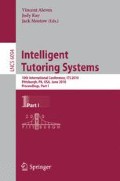Abstract
The effect of providing error-flagging support during tests was studied in spring 2009 with two tutors on while and for loops. A partial crossover design was used for the study and mixed-factor ANOVA was used to analyze the students’ score per problem, number of revised problems, effect of revision on score and time spent per problem, and finally, the effect of error-flagging on adaptation and learning. Students scored better on tests with rather than without error-flagging support. This can be attributed to the fact that students revised their answers on more problems when error-flagging feedback was provided. But, they did not necessarily revise more often per problem with error-flagging feedback.Students scored the same with revisions as without revisions, whether or not error-flagging support was provided.They spent less time per problem when error-flagging support was provided, whether or not they revised their answers. One explanation for this is that error-flagging may speed up the problem-solving process. Finally, if error-flagging feedback is provided during pre-test, students solve significantly fewer problems during the subsequent practice session which uses the outcome of the pre-test as the basis for adaptation. Therefore, providing error-flagging feedback during the pre-test improves adaptation. But, it does not result in greater learning - learning was not significantly different with versus without error-flagging feedback.
Access this chapter
Tax calculation will be finalised at checkout
Purchases are for personal use only
Preview
Unable to display preview. Download preview PDF.
References
Aimeur, E., Brassard, G., Dufort, H., Gambs, S.: CLARISSE: A Machine Learning Tool to Initialize Student Models. In: Cerri, S.A., Gouardéres, G., Paraguaçu, F. (eds.) ITS 2002. LNCS, vol. 2363, pp. 718–728. Springer, Heidelberg (2002)
Anderson, R.C., Kulhavy, R.W., Andre, T.: Feedback procedures in programmed instruction. J. Educational Psychology 62, 148–156 (1971)
Bierbaum, W.B.: Immediate knowledge of performance on multiple-choice tests. J. Programmed Instruction 3, 19–23 (1965)
Corbett, A.T., Anderson, J.R.: Locus of feedback control in computer-based tutoring: impact on learning rate, achievement and attitudes. In: Proc. SIGCHI Conference on Human Factors in Computing Systems, pp. 245–252 (2001)
Czarkowski, M., Kay, J.: Challenges of Scrutable Adaptivity. In: Proc. of AI-ED 2003, pp. 404–406. IOS Press, Amsterdam (2003)
Gilmer, J.S.: The Effects of Immediate Feedback Versus Traditional No-Feedback in a Testing Situation. In: Proc. Annual Meeting of the American Educational Research Association, April 1979, pp. 8–12 (1979)
Kumar, A.N.: A Scalable Solution for Adaptive Problem Sequencing and its Evaluation. In: Wade, V.P., Ashman, H., Smyth, B. (eds.) AH 2006. LNCS, vol. 4018, pp. 161–171. Springer, Heidelberg (2006)
Kumar, A.N.: The Effect of Providing Error-Flagging Support during Testing. In: Woolf, B.P., Aïmeur, E., Nkambou, R., Lajoie, S. (eds.) ITS 2008. LNCS, vol. 5091, pp. 799–802. Springer, Heidelberg (2008)
Kumar, A.N., Rutigliano, P.: The Effects of Error-Flagging in a Tutor on Expression Evaluation. In: 13th International Conference on Artificial Intelligence in Education (AI-ED 2007), pp. 599–601 (2007)
Montor, K.: Effect of using a self scoring answer sheet on knowledge retention. J. Educational Research 63, 435–437 (1970)
Plake, B.S.: Effects of Informed Item Selection on Test Performance and Anxiety for Examinees Administered a Self-Adapted Test. Educational and Psychological Measurement 55(5), 736–742 (1995)
Shermis, M.D., Mzumara, H.R., Bublitz, S.T.: On Test and Computer Anxiety: Test Performance Under CAT and SAT Conditions. J. Education Computing Research 24(10), 57–75 (2001)
Tait, K., Hartley, J.R., Anderson, R.C.: Feedback procedures in computer-assisted arithmetic instruction. British Journal of Educational Psychology 43, 161–171 (1973)
Author information
Authors and Affiliations
Editor information
Editors and Affiliations
Rights and permissions
Copyright information
© 2010 Springer-Verlag Berlin Heidelberg
About this paper
Cite this paper
Kumar, A.N. (2010). Error-Flagging Support for Testing and Its Effect on Adaptation. In: Aleven, V., Kay, J., Mostow, J. (eds) Intelligent Tutoring Systems. ITS 2010. Lecture Notes in Computer Science, vol 6094. Springer, Berlin, Heidelberg. https://doi.org/10.1007/978-3-642-13388-6_40
Download citation
DOI: https://doi.org/10.1007/978-3-642-13388-6_40
Publisher Name: Springer, Berlin, Heidelberg
Print ISBN: 978-3-642-13387-9
Online ISBN: 978-3-642-13388-6
eBook Packages: Computer ScienceComputer Science (R0)

